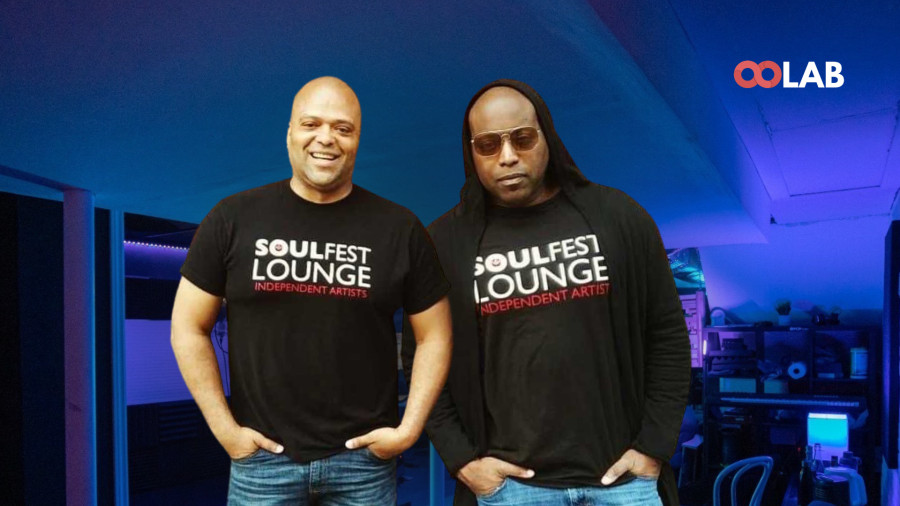But that depends on perspective. If it’s one thing Torontonians will not hesitate to tell you, it’s that this city is a well of talent for those wanting to pursue a music career. The twist is, depending on the genre you seek out, there are not as many localized outlets for these talents, particularly Black talent, to hone in on their skills and garner the support needed to excel.
From iLive to Colab
To add to the likes of community stalwarts such as ADVANCE and HoneyJam, radio and event organization iLive Radio has joined the ranks with Colab Toronto, a coworking spot specifically suited for music entrepreneurs with a photography and videography studio managed by Caught Anytime and a recording studio managed by Wav1 Sounds. There will also be a state-of-the-art podcast suite on the premises.
iLive and Colab Toronto co-founder Jason Henry is no stranger to working with artists in any capacity. On its way to celebrating its eighth year, iLive has already produced concerts, festivals, songwriter camps, workshops, and community events and even dabbled with NFTs. Moving forward, Henry explains how he and his partner Patrick Morris decided that a well-needed shift must occur.
“We wanted to re-energize and relaunch ourselves. We've invested a lot of our money into this over the years, so we wanted to find an opportunity to create a space that will allow us to pull all the pieces and elements we've done over the years into one space. So we started to look for a location that would suit that. We found one, fortunately, in downtown Toronto. When we were thinking about how to configure the space, we wanted to make sure that we had services or areas for different disciplines. For example, we wanted a recording studio, and we wanted to do a video and photography studio, so we looked at various opportunities.”
And even though inspiration converges from all corners, this one opportunity sat with Henry and Morris. “We engaged in a radio project with an organization in the U.K. last year called The Hub. They came to us to see if we could partner with them. They're based in West London, in an area called Redfin. They have a community space with a recording studio, a cafe, a workspace, a yoga studio, and various disciplines for the community. It’s very community-focused. That's where the inspiration came from when we talked about what we wanted to do here.”
A one-stop shop for music entrepreneurs
The takeaway is that a couple of outlets in the city are doing the same; however, they cater to a much different demographic—basically, not ours. But because Henry, Morris and their team have continuously operated in a grassroots way, they wanted to continue on that path. As a result, Colab Toronto will be available to members and the community.
“We wanted to find and create a member space to give them the services. But not only that, the community will have access to the services hosted inside, like the recording studio and the photography studio. We want to become more like a one-stop shop. We wanted to build something repeatable. So, if we do it in Toronto and someone has the idea to do it in Hamilton, it's not hard to set up because you've got the blueprint and the template. We've done it with iLive at our radio stations. We used the same kind of premise for Colab Toronto. So we're super excited about it. As for the feedback, we have a buzz and excitement about what we're doing. It's been a labour of love,” says Henry.
Reading the press release, one of the lines that jumped out at me was, “The music industry is unique and requires specialized resources and support.” Many artists focus more on their creative projects and how to get them out to the masses. In doing so, they’re not fully educated in the business of music. From social media to marketing and branding yourself as an artist and sustaining yourself as a business, there is much to comprehend. And it can all get overwhelming.
While that is true on many levels, I asked Henry to elaborate. He believes it’s a very different space and that the proper support system is needed behind the scenes to do things effectively. “Artists understand how to make music, and they have opportunities to put their music out in a certain way. Distribution is taken care of for them. But what about all the other aspects? The financial aspects, the publishing aspects, the legal aspects? There are specific things you should be doing regarding music.”
“Let's be clear. Music is not making money. Streams aren't making the money you would earn from physical asset sales. But it is a calling or business card for yourself to build your fan base or your music community. They allow you to tour and sell merchandise. Right now, we are working on recruiting mentors and advocates that will be running workshops. We will have the training inside the space for members coming in and taking up hot desks so that they have available resources,” says Henry.
Colab Toronto: in the community for the community
A big part of Colab Toronto’s outreach is building with the community through resources and programming. Memberships will be available monthly and include access to all amenities and programming. Nonetheless, there will be many options for non-members to participate in workshops and drop-ins, which was a must-have for the founders.
Colab Toronto is working to be inclusive, not exclusive. They’ll be collaborating with other organizations and community leaders for workshops. They will also have several technical and educational programs in the works, covering everything from legal, budgeting and contracts to marketing and publishing. There are no boundaries. And the most compelling argument here is that it’s all ours.
“It’s a definite element of the human factor needed here, and it creates a platform and springboard to do other and more collaborative projects. Working together brings greater visibility. Being connected brings greater visibility overall, to be honest. It's an underrepresented area within Canada. Not just Toronto, within Canada. To have a place, a space we control rather than being controlled for us.”
More than anything, it’s the community building that Henry yearns for. While Colab Toronto plans to work with other local area initiatives to foster these networks, the community will be at the centre of it all. Henry wants to get people into spaces to commune and rebuild. To have a place to congregate, gain knowledge and share their craft. After all, if it’s not about community, is it all really worth it?
“There will be enough groundwork for people to join, patronize, get some benefits and start rebuilding our community. Because that's what our target is, to reconnect and rebuild our community touchpoints as opposed to just social media and Instagram. There's room for ideation, and there's room for collaboration. Hence Colab.”
Henry makes it clear: Colab Toronto is not exclusively for Black people. It’s for artists, musicians and entrepreneurs in that space. But we can’t deny that seeing this as a Black-owned venture brings us so much joy. We don’t get to see this every day, especially in Canada. So that alone is a monumental moment that the Colab crew can be proud of. And Henry is well aware of its status. “We want to make a mark in this city as a great organization that is Black-owned, not just for myself, but for our community.”
“Too often, our ideas get co-opted by someone else because we don't have the funding, or we don't have the reach, or we just don't have the business know-how to grow to certain levels. So people come in, and other communities take our art and culture. We want to ensure that ownership is higher on the agenda—that it’s controlled and recognized as Black ownership.”
Colab Toronto is located at 226 Queen Street East, in the heart of Toronto, and will open at the end of April 2023.

 By
By 





